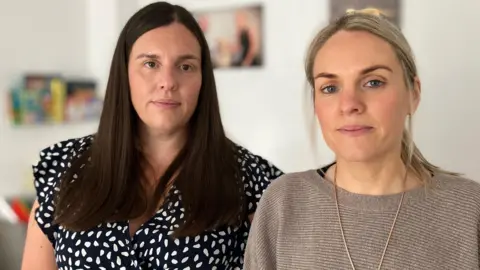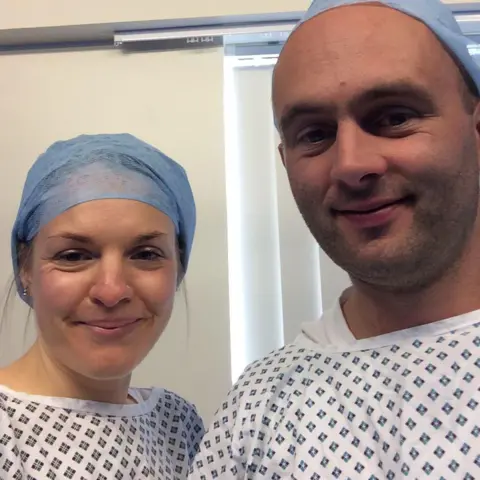 BBC
BBCTwo sisters living with a condition that affects the way their ovaries work have said they were left feeling alone and without support as they tried to find out if she had been diagnosed. what is
Annika Thomas, 39, and Sarah Davies, 44, from Carmarthenshire, experienced symptoms such as irregular periods, infertility and low mood due to polycystic ovary syndrome (PCOS).
Cardiff University research has shown that the condition is becoming more common and suggests that due to the various symptoms, women tend to need more options, costing the UK an estimated £1.2 bn per year.
The Welsh Government has said that its women’s health plan, which includes PCOS, will be published by the end of the year and has invested in research.
During PCOS awareness month, Annika and Sarah said they both went through different periods for years before they were diagnosed with PCOS.
“It started with my cycles, they were very light, there was a long time between them,” said Annika.
“Because I’m not a typical PCOS patient – what they’re looking for is overweight, excessive hair…acne – because I didn’t have the symptoms they didn’t want to check. I persisted .”

“But years and years would go by before I felt like I got anywhere because I was chasing trials and it took forever.”
Now a mother of three, Annika says she had a “difficult few years” before her first son was born in 2018 through IVF treatment.
“It was a very emotional moment,” he said.
“You feel alone. I was never supported.”
Sarah says there was a lack of holistic thinking as she attended various appointments for the many PCOS symptoms she experienced.
“It’s the biggest [symptom] for me it was barren. “But I’ve always had breakouts, acne, and another big one for me is my weight, it’s always up and down,” she said.
“Sometimes emotions are low, especially in difficult times like infertility. PCOS is a very complicated condition.”
What is polycystic ovary syndrome, or PCOS?
PCOS is a condition that affects many parts of the body, including metabolism and ovarian function.
One of the main symptoms is irregular periods due to the ovaries not releasing eggs regularly, which can lead to fertility problems.
Symptoms also include excessive facial or body hair, acne, hair loss, and in some patients, weight gain.
In the long term, patients may be at increased risk for depression, anxiety, type 2 diabetes and heart disease.

A spokesperson for the Hywel Dda University Health Board said “it is always sad to hear when patients are unhappy with the treatment they have received”.
“We always strive to improve communication between our departments so that patients can be seen by nurses who can help them as soon as possible,” they added.
According to a new study by Cardiff University Medical School, a larger number of people are now being diagnosed.
A team of experts studied more than 120,000 patients with PCOS and found that the risk increased among patients of low socioeconomic status and of Asian ethnicity.
Experts concluded that more money is needed for research and to develop tools to support patients.
 A family photo
A family photoProfessor of Endocrinology Aled Rees says it has a “huge impact” on a patient’s quality of life.
“It can be difficult to diagnose. Irregular periods, missed periods, weight problems, unwanted hair growth and problems surrounding fertility,” she said.
“The frustration is that we don’t have a specific treatment for the condition, so we need more research.
“There is less awareness now but there is still a gap.”
Victoria Vasey, director of Women’s Equality Network Wales, said the findings were not surprising.
“What we’re hearing from members is that this is a very difficult condition, with significant health consequences,” Ms Vasey said.
“But partly due to misdiagnosis or late diagnosis and symptoms, it also has a significant impact on mental health.
“This is a problem that affects a large number of women, but if we know that it affects women in certain groups, then that helps us with solutions.”
A Welsh government spokesman said all health boards were expected to “take appropriate action to improve women’s experiences and outcomes and address any inequalities”.
“This year we appointed the first women’s health leader and created a women’s health network which is developing and promoting the 10-year women’s health strategy for Wales,” it said so.
“The plan will address a wide range of women’s health, including menstrual health and PCOS. The plan should be published by the end of 2024.
“We have also announced £750,000 in research focusing on women’s health priorities to be delivered by 2025.”
#Polycystic #ovary #syndrome #Welsh #sisters #hunt #answers #PCOS
